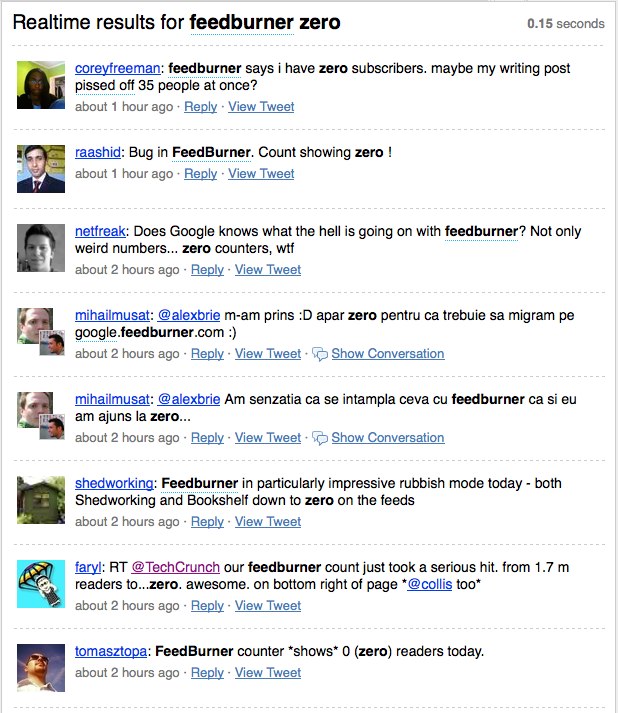Complaints about Feedburner, a service that helps websites manage their RSS feeds, have been around as long as the company itself. But you’d think that when Google spent $100 million to buy the company, they’d get it together.
But things haven’t gotten better. Instead, the service is becoming unreliable. Feedburner problems plague website owners far more than they should. And while Google is notoriously slow in absorbing its acquisitions, it’s far past time for them to get their act together and turn Feedburner into a grown up service.
Sites like ours rely on our RSS feeds to distribute content widely. Nearly 2 million TechCrunch readers access our content primarily through our RSS feeds, and many of those people never visit the site at all. But even so, they are among our most valuable readers because they’ve taken the action to subscribe to our content feed. For the most part, they don’t stop reading.
But when those feeds don’t work, it’s a terrible experience. The most common problem we’ve seen over the years is a general slowdown in content distribution. For various reasons, Feedburner can delay news for minutes or longer. When news is breaking, that’s a deal killer.
The biggest reason to use Feedburner to manage your RSS feeds is the data you get back on how many people are accessing the feed, what they’re reading, etc. Some of this data can be made public- for example, we’ve included a widget on the site (currently on the bottom right of the page) that displays how many people accessed the RSS feed the previous day. Usually that widget says 1.7 million or so. Today it says zero. Lots of other people are complaining about the same thing (also see the screen shot from Twitter search below).
The main Feedburner blog was shut down in December 2008 and everyone was told to head over to an advertising-focused blog for Feedburner news. I think it’s great that Google wants to do a better job of inserting ads into feeds to make money for publishers. But they have to focus on the quality of the service, too, or the ecosystem won’t work. The message they’re sending to everyone is that the service doesn’t deserve a blog, just the advertising they bolt onto it. Imagine if they did the same thing with search.
Feedburner also has a known issues page that shows what’s currently wrong with the service. It’s clear from that page that the team is having a lot of problems just keeping the lights on. The fact that this most recent issue, broken stats, isn’t reported there yet even though its days old is another red flag.
Feedburner being down is about as acceptable to me as the electricity being turned off at my house. When it happens, nothing else gets done until its fixed, and a lot of other things are directly or indirectly affected.
If Google wants to continue to manage our feeds, we need assurances from them that they want our business. Right now, I don’t believe they do. The people working on Feedburner clearly care about the product and their customers, but they either don’t have enough people or enough resources to take care of business.
